模块1 Unit 1 School life Reading(1):School life in the UK 课件(34张)
文档属性
| 名称 | 模块1 Unit 1 School life Reading(1):School life in the UK 课件(34张) |  | |
| 格式 | zip | ||
| 文件大小 | 701.4KB | ||
| 资源类型 | 教案 | ||
| 版本资源 | 牛津译林版 | ||
| 科目 | 英语 | ||
| 更新时间 | 2019-07-21 16:41:57 | ||
图片预览

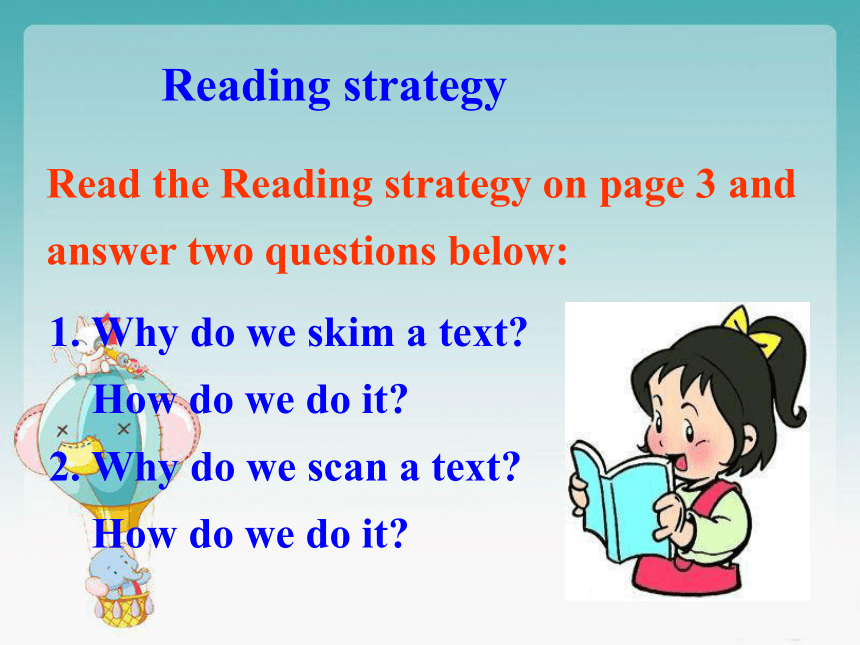

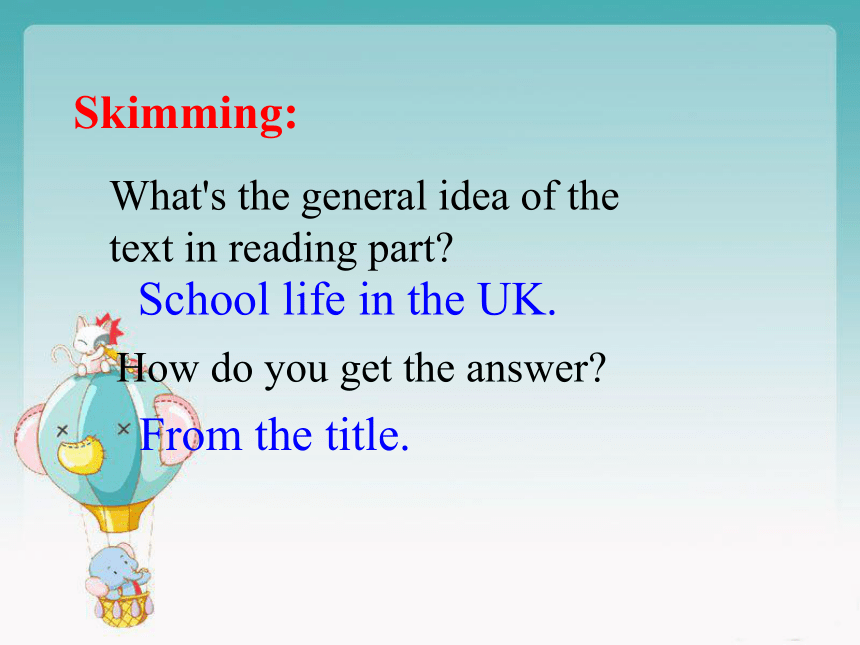
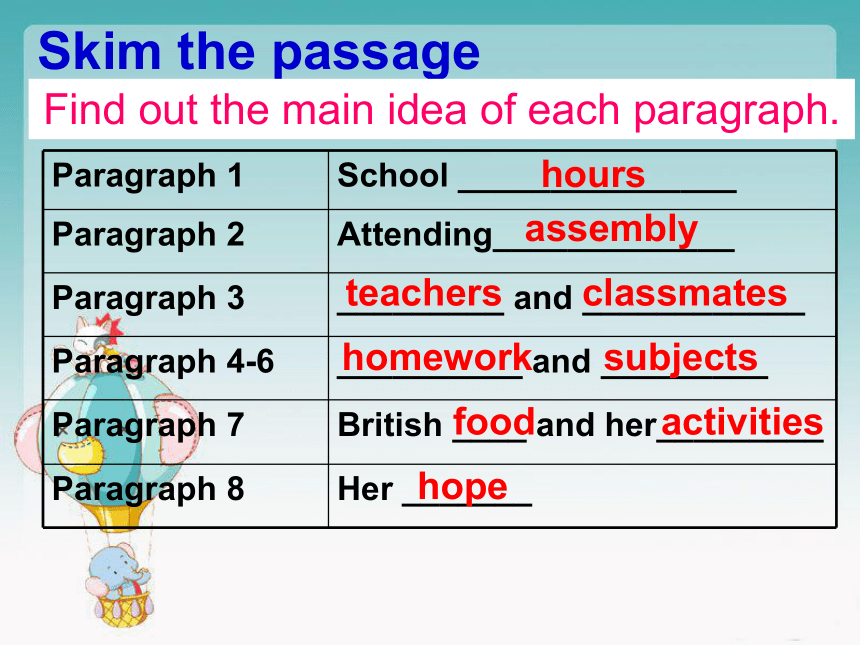

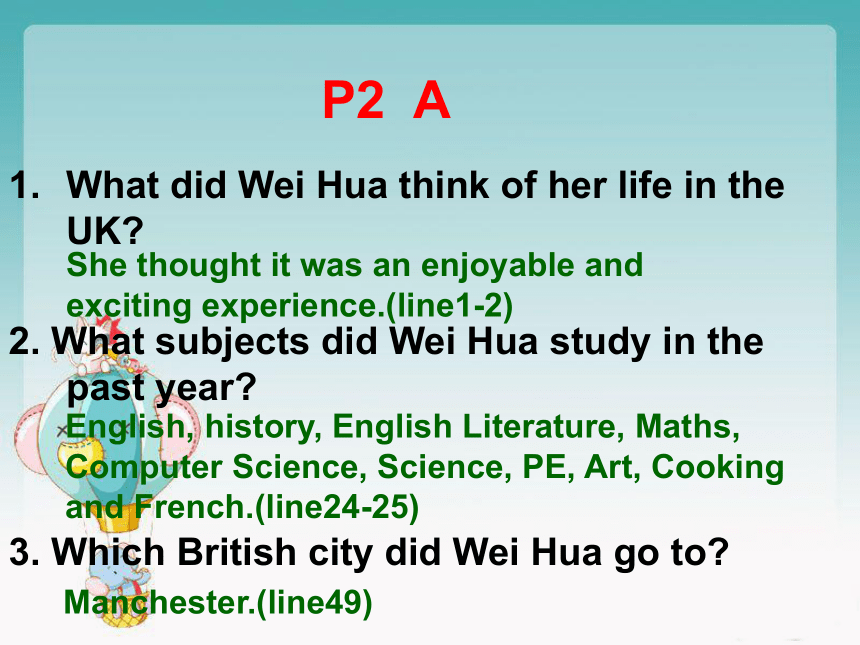

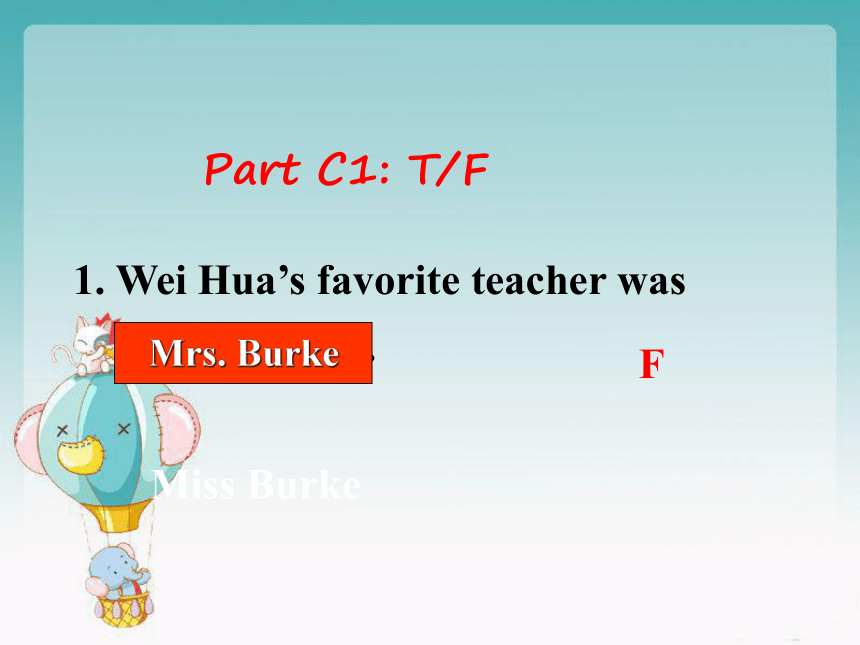



文档简介
课件34张PPT。Reading (1) School Life in the UK
Reading strategyRead the Reading strategy on page 3 and answer two questions below: Why do we skim a text?
How do we do it?
2. Why do we scan a text?
How do we do it? to get a general ideaWe skim the text when we want to get a general idea of what it is about .
We focus on: the titles, the first and last paragraphs, pictures and charts.Reading strategy —skimmingSkimming:What's the general idea of the text in reading part?School life in the UK.How do you get the answer?From the title.Skim the passageFind out the main idea of each paragraph.hoursassemblyteachersclassmates homeworksubjectsfoodactivitieshopeWe scan the text when we want to find
certain information in a text quickly.
We focus on: key words and phrases
dates, numbers.Scanning to get certain information P2 AWhat did Wei Hua think of her life in the UK?
2. What subjects did Wei Hua study in the past year?
3. Which British city did Wei Hua go to?
She thought it was an enjoyable and
exciting experience.(line1-2)English, history, English Literature, Maths,
Computer Science, Science, PE, Art, Cooking
and French.(line24-25)Manchester.(line49)ManchesterPart C1: T/F1. Wei Hua’s favorite teacher was
Mr. Heywood.FMrs. BurkeMiss Burke2. Most British classes have fewer than
thirty students.
3. Wei Hua had more homework in her
school in China.
4. It was very expensive for Wei Hua to
communicate with her parents. TTFfree5. In the UK, students can choose to
stop studying any subject.
6. The cake made by Wei Hua did not
taste good.FFsomeCareful Reading
Part C2 According to the headmaster, What
should the students spend much time on?
They should devote themselves to study.
2 Why was it a struggle for Wei Hua to
remember the names of her classmates?
Because there were different students in
some classes.3.Why did Wei Hua find her homework
difficult at first?
Because all the homework was in
English.
4. Who gave Wei hua a lot of support in
her studies?
The teacher gave her much encouragement.5. How did Wei Hua manage to
improve her English?
She used English Everyday and spent
an hour each day reading English
books in the library.
6. What do the British like eating at
the end of dinner?
They like to eat dessert at the end of
dinner.
expericenceheadmasteraverageimprovedextrastopHomeworkchallengingrelaxedfreeConsolidation: Task-based reading Homework1. Part E
2. Preview language points in readingReading (2)Language focus
▲experience
(1) un. 经验,从经验中获得的知识和技能
(2) cn. 经历
(3) vt.体验,经历
(4) experienced
adj.有经验的,经验丰富的1. Going to a British high school for one year was a very enjoyable and exciting experience for me. The _________________ mountain climber _________________a lot, and he gained much _________________ from his own adventurous _________________.experiencedexperiencedexperienceexperiences 那个有经验的登山者经历了许多,他从自己的冒险经历中获得了许多经验。
1) Jumping out of an airplane at ten thousand feet is quite ________ exciting experience. (NMET 2002, 26)
the B. a C. an D./
2) The job calls for ___ ___________ ____.
这份工作需要一个有经验的人。
3) Please tell us your ___________ in America.
请你告诉我们你在美洲的经历。
4) Our English teacher has _________in
teaching.
A. many experience B. much experience
C. much experiences D. few experience Can experienced manexperiencesB Going to a British school for one year was a very enjoyable experience for me.
Eg. 1. Walking after a meal is a very
good habbit.
2. Playing with fire is dangerous.
这里不许抽烟。
眼见为实
玩电脑游戏, 收集邮票以及绘画是他的爱好。
Smoking is not allowed here. Seeing is believing. Playing computer games, collecting stamps as well as drawing pictures are his hobbies.
2. On the first day, all the students went to attend assembly.
(1) vt.出席,参加(讲座、会议、婚礼等)be present atattend, join, join in, take part in1. He _______ the army in the year of 2003.
2. How many of you will ____________ the
coming sports meeting?
3. Who is going to ____________ the concert
with me tomorrow?
4. Won’t you ________ us ______ the
tennis match? joinedtake part inattendjoin in3. He also told us that the best way to earn respect was to devote ourselves to study and achieve high grades.4.devote
1) devote time/effort/money to 为……付出时间/努力/金钱等(to use your time effort etc. in order to do something or help something be successful)
Please____________________________________.
请把更多的时间用于学习上。
2) devote oneself to 现身于……;专心致力于……
She _________________________________the poor. 她全身心倾注在照顾穷苦人一事上。
devoted adj. 挚爱的、忠诚的
e.g. a devoted father 慈爱的父亲
devotion n. [U] 奉献、现身;挚爱、忠诚
e.g. her devotion to her job 对工作的全心投入
devote more time to your studydevoted herself to caring forprep. 介词5.average
adj.一般的,普通的;平均的
n.平均数
e.g.
The average age of the team is 16.
The average age of 8 and 6 is 7.6.used to do/be used to do/be used to doingused to do 过去常常做(暗含现在不做了)
否定式:usedn't to do/ didn't use to
be used to do 被用来做某事
be/get used to doing 习惯做某事
I used to get up about 7 a.m..
The medicine is used to cure cancer.
After spending 4 years in Changsha, I think I have got used to the weather here. 7. I missed Chinese food a lot at lunch time.miss v. 思念, 想念; 错过, 躲过;
未击中,未达到(目标)
missing adj. 丢失的,不在的,失踪的
1)He fired at the tiger but missed (it).
miss means: ___________
2)Her son has gone to the USA, and she
misses him very much.
miss means: ___________
3) He missed the 9.30 train and therefore
missed the accident.
miss means: ___________
4) We missed seeing the film when it was at the
local cinema.
miss means:_________Exercises:
Miss Rose missed the only school bus that can take her to see her parents whom she missed very much.Homework教材P4 D1
考一本 p11-p12
Reading strategyRead the Reading strategy on page 3 and answer two questions below: Why do we skim a text?
How do we do it?
2. Why do we scan a text?
How do we do it? to get a general ideaWe skim the text when we want to get a general idea of what it is about .
We focus on: the titles, the first and last paragraphs, pictures and charts.Reading strategy —skimmingSkimming:What's the general idea of the text in reading part?School life in the UK.How do you get the answer?From the title.Skim the passageFind out the main idea of each paragraph.hoursassemblyteachersclassmates homeworksubjectsfoodactivitieshopeWe scan the text when we want to find
certain information in a text quickly.
We focus on: key words and phrases
dates, numbers.Scanning to get certain information P2 AWhat did Wei Hua think of her life in the UK?
2. What subjects did Wei Hua study in the past year?
3. Which British city did Wei Hua go to?
She thought it was an enjoyable and
exciting experience.(line1-2)English, history, English Literature, Maths,
Computer Science, Science, PE, Art, Cooking
and French.(line24-25)Manchester.(line49)ManchesterPart C1: T/F1. Wei Hua’s favorite teacher was
Mr. Heywood.FMrs. BurkeMiss Burke2. Most British classes have fewer than
thirty students.
3. Wei Hua had more homework in her
school in China.
4. It was very expensive for Wei Hua to
communicate with her parents. TTFfree5. In the UK, students can choose to
stop studying any subject.
6. The cake made by Wei Hua did not
taste good.FFsomeCareful Reading
Part C2 According to the headmaster, What
should the students spend much time on?
They should devote themselves to study.
2 Why was it a struggle for Wei Hua to
remember the names of her classmates?
Because there were different students in
some classes.3.Why did Wei Hua find her homework
difficult at first?
Because all the homework was in
English.
4. Who gave Wei hua a lot of support in
her studies?
The teacher gave her much encouragement.5. How did Wei Hua manage to
improve her English?
She used English Everyday and spent
an hour each day reading English
books in the library.
6. What do the British like eating at
the end of dinner?
They like to eat dessert at the end of
dinner.
expericenceheadmasteraverageimprovedextrastopHomeworkchallengingrelaxedfreeConsolidation: Task-based reading Homework1. Part E
2. Preview language points in readingReading (2)Language focus
▲experience
(1) un. 经验,从经验中获得的知识和技能
(2) cn. 经历
(3) vt.体验,经历
(4) experienced
adj.有经验的,经验丰富的1. Going to a British high school for one year was a very enjoyable and exciting experience for me. The _________________ mountain climber _________________a lot, and he gained much _________________ from his own adventurous _________________.experiencedexperiencedexperienceexperiences 那个有经验的登山者经历了许多,他从自己的冒险经历中获得了许多经验。
1) Jumping out of an airplane at ten thousand feet is quite ________ exciting experience. (NMET 2002, 26)
the B. a C. an D./
2) The job calls for ___ ___________ ____.
这份工作需要一个有经验的人。
3) Please tell us your ___________ in America.
请你告诉我们你在美洲的经历。
4) Our English teacher has _________in
teaching.
A. many experience B. much experience
C. much experiences D. few experience Can experienced manexperiencesB Going to a British school for one year was a very enjoyable experience for me.
Eg. 1. Walking after a meal is a very
good habbit.
2. Playing with fire is dangerous.
这里不许抽烟。
眼见为实
玩电脑游戏, 收集邮票以及绘画是他的爱好。
Smoking is not allowed here. Seeing is believing. Playing computer games, collecting stamps as well as drawing pictures are his hobbies.
2. On the first day, all the students went to attend assembly.
(1) vt.出席,参加(讲座、会议、婚礼等)be present atattend, join, join in, take part in1. He _______ the army in the year of 2003.
2. How many of you will ____________ the
coming sports meeting?
3. Who is going to ____________ the concert
with me tomorrow?
4. Won’t you ________ us ______ the
tennis match? joinedtake part inattendjoin in3. He also told us that the best way to earn respect was to devote ourselves to study and achieve high grades.4.devote
1) devote time/effort/money to 为……付出时间/努力/金钱等(to use your time effort etc. in order to do something or help something be successful)
Please____________________________________.
请把更多的时间用于学习上。
2) devote oneself to 现身于……;专心致力于……
She _________________________________the poor. 她全身心倾注在照顾穷苦人一事上。
devoted adj. 挚爱的、忠诚的
e.g. a devoted father 慈爱的父亲
devotion n. [U] 奉献、现身;挚爱、忠诚
e.g. her devotion to her job 对工作的全心投入
devote more time to your studydevoted herself to caring forprep. 介词5.average
adj.一般的,普通的;平均的
n.平均数
e.g.
The average age of the team is 16.
The average age of 8 and 6 is 7.6.used to do/be used to do/be used to doingused to do 过去常常做(暗含现在不做了)
否定式:usedn't to do/ didn't use to
be used to do 被用来做某事
be/get used to doing 习惯做某事
I used to get up about 7 a.m..
The medicine is used to cure cancer.
After spending 4 years in Changsha, I think I have got used to the weather here. 7. I missed Chinese food a lot at lunch time.miss v. 思念, 想念; 错过, 躲过;
未击中,未达到(目标)
missing adj. 丢失的,不在的,失踪的
1)He fired at the tiger but missed (it).
miss means: ___________
2)Her son has gone to the USA, and she
misses him very much.
miss means: ___________
3) He missed the 9.30 train and therefore
missed the accident.
miss means: ___________
4) We missed seeing the film when it was at the
local cinema.
miss means:_________Exercises:
Miss Rose missed the only school bus that can take her to see her parents whom she missed very much.Homework教材P4 D1
考一本 p11-p12
